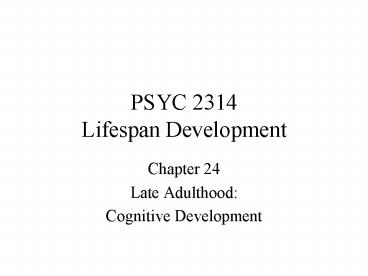PSYC 2314 Lifespan Development - PowerPoint PPT Presentation
1 / 17
Title:
PSYC 2314 Lifespan Development
Description:
Takes longer to register sensory information, and the information ... Practical ... Therapeutic Risk Taking nursing home residents are encouraged ... – PowerPoint PPT presentation
Number of Views:45
Avg rating:3.0/5.0
Title: PSYC 2314 Lifespan Development
1
PSYC 2314Lifespan Development
- Chapter 24
- Late Adulthood
- Cognitive Development
2
Changes in Information Processing
- Sensory Register
- Takes longer to register sensory information, and
the information fades more quickly - Some stimuli may go undetected
- Working Memory
- Smaller capacity
- Difficulty holding new information in mind while
simultaneously analyzing it in complex ways.
3
Changes in Information Processing
- Knowledge Base
- Long-term as well as short-term memory are
diminished in older adults. - Some knowledge, under particular circumstances,
is much easier for older adults to retrieve than
other kinds. - Accuracy also varies, with distortion much more
likely to occur for certain kinds of memories.
4
Changes in Information Processing
- Two forms of Memory
- Implicit automatic, unconscious memory
- Explicit conscious memory
- Management of the control processes of memory,
such as storage mechanisms, selective attention,
retrieval strategies, and logical analysis, is
generally less efficient in older adults.
5
Reasons for Age-Related Changes
- Psychosocial cultural stereotypes of aging
emphasize memory impairment - Problems with lab research lab experiments do
not reflect differences in context and motivation - Changes in brain lost at least 5 in weight and
10 in volume due to the increasing death rate of
neurons (which do not reproduce themselves) after
age 60.
6
Cognition in Daily Life
- Four general conclusions
- Mental processes slow down with age
- The elderly do show memory declines
- The elderly are less likely to use memory
strategies - Memory in late adulthood is not as weak as
anticipated.
7
Practical Competence in Nursing Home
- Contextual factors that lead directly to lack of
intellectual stimulation and, consequently, to
intellectual declines. - Therapeutic Risk Takingnursing home residents
are encouraged to manage on their own, many take
more control over their activities, developing
their own schedules and social lives
8
Slowing Down the Rate of Cognition Declines
- Regular exercise
- Cognitive stimulation
- Low-fat diets
- Consumption of antioxidants
- Estrogen replacement in women
- Use of anti-inflammatory drugs
9
Impact on Cognition
- Four factors that have direct impact on thinking
during adulthood - Pulmonary functioning
- Physical exercise
- Past education
- Individuals sense of control
10
Dementia
- Severely impaired judgment, memory, or
problem-solving ability. - Presenile dementia when it occurred before age
60 - Senile dementia or senile psychosis when it
occurred after age 60
11
Alzheimers Disease
- First stage a general forgetfulness
- Second stage more general confusion and
noticeable deficits in concentration and
short-term memory personality changes such as
withdrawal or spontaneous outbursts of temper or
tears
12
Alzheimers Disease
- Third stage memory loss becomes dangerous
person is no longer able to take care of basic
needs. - Fourth stage require full-time care.
- Fifth stage become completely mute and do not
respond to any stimulus.
13
Multi-infarct Dementia (MID)
- Temporary obstruction of blood vessels supplying
the brain with blood. - People with circulatory problems are at risk
14
Subcortical Dementias
- Cause a progressive loss of motor control but
initially leave thinking intact - Parkinsons, Huntingtons and multiple sclerosis
- Picks disease
15
Reversible Dementia
- Symptoms of dementia can also result from
medication, alcohol abuse, mental illness or
depression - Patients may actually experiencing psychological
illness - Causes can also be brain injuries, brain tumors,
and head injuries that result in an excess of
fluid pressing on the brain
16
New Cognitive Development
- Eriksons older adults are more interested in
arts, children, and the whole of human experience - Maslows more likely to reach
self-actualization - Life review an effort is made to connect ones
own life with future and past generations.
17
Paul Baltes Wisdom
- Rich factual knowledge that concerns the broad
topic of human experience - Entails knowledge of the pragmatics of life
- Defines a contextual approach to life problems
- Accepts uncertainty in defining and solving life
problems - Recognizes individual differences in values,
goals, and priorities































